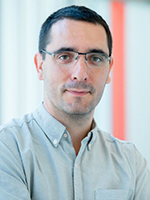
Our research expert Dr. Fidel Vila-Rodriguez shares why you might want to add mindfulness to you and your family’s routine.
Given the hectic and often distraction-heavy lives many of us lead, it is no surprise that mindfulness practices are increasing in popularity. Mindfulness is now practiced in schools, in workplaces and by countless people around the world. To learn why, we got in touch with Vancouver Coastal Health Research Institute clinician-scientist Dr. Fidel Vila-Rodriguez.
Q: My life is so hectic right now, and I still need to plan for the holidays. I heard that mindfulness can help with managing stress, but what is it exactly?
A: The holidays can be a stressful time of year, and mindfulness may be able to help you. Mindfulness has roots in eastern religions, yoga and non-religious meditation. Modern mindfulness practices can be described as the act of focusing one’s attention on the present moment and noticing sensations. So, for example, during a meal, try to focus on the texture and flavour of your food, instead of thinking about the gifts you still need to buy or make after you finish eating. Doing this regularly could also improve your mood and ability to focus, which can help you juggle all of the things on your to-do list.
Q: I tried yoga a couple of times. Was I also practicing mindfulness?
A: Yoga and mindfulness share some common characteristics, but they are not one in the same. Some yoga practices emphasize physical movements, such as building strength and flexibility. Yoga instructors may also encourage mindful behaviours, such as focusing on your breathing. Others may include an aspect of meditation, which can be similar to mindfulness. While it can be an ingredient in both meditation and yoga, mindfulness is essentially about experiencing the present moment in whatever form.
Q: Can mindfulness help me cope with low moods, or depression and anxiety?
A: Yes, it certainly can help with managing stress, anxiety and low moods. One of the treatments we often use with our patients at the NINET Institute of Mental Health in Vancouver is mindfulness. Patients who practice mindfulness often report becoming more receptive to what is happening in their lives, being able to draw more pleasure from what they do and an overall improvement in their moods.
Q: My kids are doing mindfulness exercises in school. Is this a good thing for children to do?
A: It can potentially be good for kids to practice mindfulness to help draw their attention to the here and now, and away from all of the stimulation that frequently surrounds them, such as technology and advertisements. The practice can have a positive impact on their developing brains by helping strengthen their ability to focus and tune out distractions. It can also assist children with becoming more aware of their moods and reactions.
Q: What are some tips for starting a mindfulness practice?
A: Mindfulness can be practiced by anyone at any age, and without any prior training. It does require some attention, particularly nowadays when we are constantly surrounded by distractions, such as our smartphones. The main idea is to be both physically and mentally present in the moment.
Here are a few exercises that can help you get started or add to your current mindfulness practice:
- Commit a certain amount of time each day or week to practicing mindfulness, such as during two meals per week.
- Put away your phone and computer when you start your practice.
- Take a five-minute walk and become aware of your feet moving over the ground and your breathing.
- When out with friends, concentrate on the conversation instead of allowing your mind to wander or checking your phone.
- Before going to bed, set aside some time to relax without the presence of screens.
- Take a moment each day to focus on your five senses—seeing, touching, smelling, tasting and hearing.



